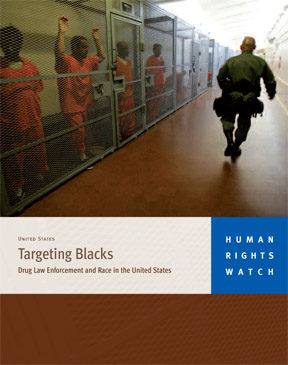It's not exactly "stop the presses" material, but two new reports from Human Rights Watch and the Sentencing Project provide even more confirmation that America's drug war is racially biased and waged mainly against black Americans.
In more than 200 cities worldwide, activists celebrated the Global Marijuana March on Saturday. But in a handful of places, there was trouble, with local authorities trying to repress the marches. Here's a report.
Will SDSU's Drug Bust Reduce Drug Availability on Campus in the Future? Advocates Urge Media to Look Beyond the Surface, Ask Critical Questions About Raid's Long-Term Implications for Drug Trade (or Lack Thereof)
Clergy are speaking out against the war on drugs! Donate $16 or more (or whatever you can afford) and we'll send you a copy.
Belated justice comes for two crooked cops, one in Dallas and one in Long Beach.
Alabama lawmakers declined to ban salvia divinorum, letting two bills die this week, but a prohibition on the psychedelic plant went into effect in Kansas.
House Judiciary Committee Chairman Rep. John Conyers (D-MI) has sent the DEA a letter demanding that it explain its raids on medical marijuana patients and providers in California. He's threatening to hold hearings, too.
A conservative Oregon political operative who specializes in "tough on crime" ballot initiatives has given up plans for an initiative that would undo the Oregon Medical Marijuana Act -- at least for this year.
The Texas attorney general has issued an opinion that a law passed last year to allow a needle exchange program in San Antonio does not protect exchange workers from arrest under state paraphernalia laws, so the Lone Star State's first officially-sanctioned needle exchange is dead -- for now.
As expected, the British government announced Wednesday it would reclassify marijuana as a more dangerous drug, thus theoretically increasing maximum jail sentences for pot smokers. In so doing, the government rejected the recommendation of its own advisory panel that marijuana stay a Class B drug.
Marijuana is big business in the Netherlands -- a conservative estimate says that the government collects $600 million a year in tax revenues from the coffee shops.
Iran complains that the West is ignoring opium production in Afghanistan, and some US Marines inadvertently help Tehran make its case.
Events and quotes of note from this week's drug policy events of years past.
"Drug Cops Raid Innocent Man, Shoot Him 5 Times, Then File Bogus Charges," "Mississippi Drug War Blues: The Case of Cory Maye," "British Prime Minister Ignores His Own Experts and increases Penalties for Marijuana," "Judge Says Stun Guns Can't Be Mentioned in Autopsies," "John Conyers Demands Answers From DEA Over the Medical Marijuana Raids," "Don't Use Text Messages to Advertise Your Cocaine Prices," "Man Dies After Being Denied a Liver Transplant For Using Medical Marijuana," "Bloody Culiacan," "Dia Mundial de la Marijuana (Global Marijuana Day), Mexico City," "Will SDSU Drug Bust Coverage Ask the Critical Questions?," "Marijuana: UKâs Police and Drug Policy Experts Object to PMâs Reefer Madness," "Nobody is Safe from Drug Prohibitionâs SWAT Teams."
Do you read Drug War Chronicle? If so, we need your feedback to evaluate our work and make the case for Drug War Chronicle to funders. We need donations too.
Apply for an internship at DRCNet for this fall (or spring), and you could spend the semester fighting the good fight!
Support the cause by featuring automatically-updating Drug War Chronicle and other DRCNet content links on your web site!
A new way for you to receive DRCNet articles -- Drug War Chronicle and more -- is now available.
Visit our new web site each day to see a running countdown to the events coming up the soonest, and more.
America's drug laws do not reference race, but the way they are enforced has a gravely disproportionate impact on African Americans, according to two reports released this week. While the two studies' conclusions are no surprise to anyone who has observed the evolution of American drug law enforcement, they provide yet more confirmation that drug prohibition in the United States reeks of racial injustice.
Released together, the two reports, one from Human Rights Watch and one from the Sentencing Project, paint a picture of a society where the color of one's skin seems to be the biggest determinant of whether one will be arrested or imprisoned on drug charges. While whites commit more drug offenses, blacks are much more likely to be busted and jailed for them, the reports found.
In its report, "Targeting Blacks: Drug Law Enforcement and Race in the United States," Human Rights Watch examined racial disparities among drug offenders in 34 states. In those states, black men were 11.8 times more likely to be arrested on drug charges than whites, and black women were 4.8 times more likely to be arrested on drug charges.
In 16 of those states, blacks are sent to prison on drug charges at rates more than 10 times greater than whites, Human Rights Watch found. The states with the most egregious racial disparities in sentencing are, in rank order, Wisconsin, Illinois, New Jersey, Maryland, West Virginia, Colorado, New York, Virginia, Pennsylvania, and Michigan.
While blacks make up 13% of the population, they accounted for 33% of all drug arrests and more than 53% of all drug offenders entering prison in 2003, the last year studied in the report.
"Most drug offenders are white, but most of the drug offenders sent to prison are black," said Jamie Fellner, senior counsel in the US program at Human Rights Watch and author of the report. "The solution is not to imprison more whites but to radically rethink how to deal with drug abuse and low-level drug offenders."
While the Human Rights Watch report examined disparities at the state level, the Sentencing Project's 45-page study, "Disparity by Geography: The War on Drugs in America's Cities," looked at racial disparities at the municipal level. The findings were equally grim. In examining data from 43 of the nation's largest cities, the report found that since 1980, the rate of drug arrests for blacks in those cities had increased 225%. While whites have also been caught up in the ever-expanding drug war, their arrest rate increased by a much lower 70%.
In 11 of the cities examined, black arrest rates on drug charges are more than five times what they were in 1980. In half of those cities, blacks were more than twice as likely as whites to be arrested, even though use rates are roughly constant along racial lines.
"The alarming increase in drug arrests since 1980, concentrated among African Americans, raises fundamental questions about fairness and justice," said Ryan King, policy analyst for The Sentencing Project and author of the report. "But even more troubling is the fact that these trends come not as the result of higher rates of drug use among African Americans, but, instead, the decisions by local officials about where to pursue drug enforcement."
The impact of local decisions about how to prosecute the drug war can be seen in cities across the country. In Tucson and Buffalo drug arrests have increased more than eight-fold between 1980 and 2003; in Kansas City and Toledo, more than seven-fold; in Newark and Sacramento, about six-fold. In some other cities, such as San Francisco and Seattle, policing decisions have resulted in much lower increases in drug arrests.
As Human Rights Watch's Fellner noted above, the answer is not to arrest and imprison more white people for drug offenses. Instead, Human Rights Watch and The Sentencing Project urged public officials to address racial inequities and restore credibility to the criminal justice system with a number of reforms, including:
- Eliminating mandatory minimum sentences and restoring judicial discretion to sentencing of drug offenders;
- Increasing public funding of substance abuse treatment and prevention outreach to make these readily available in communities of color in particular;
- Enhancing public health-based strategies to reduce harms associated with drug abuse and reallocating public resources accordingly.
back to top
Saturday was the first Saturday in May, which for more than 30 years has been marked by marches and demonstrations in support of marijuana legalization. Known alternately as the Million Marijuana March, International Marijuana Day, or the Global Marijuana March, this year's commemoration saw marches or protests in more than 200 cities across the globe.

Mexico City
Most went over without problems or controversy, whether large or small, Some 10,000 people marched and toked in Toronto without significant problems, and thousands more celebrated in
Mexico City's Alameda Central. In New York City, hundreds of people braved soggy weather in the annual march. Even smaller protests, like those in Rapid City, South Dakota, and Raleigh, North Carolina, came off without a hitch.
But in a relative handful of locations, local authorities responded with repression against the exercise of free speech on marijuana law reform. In Brazil, marches in a number of cities were blocked by court orders; in Belgium, police arrested activists on questionable grounds; in Russia, authorities quashed demonstrations; and in Australia, heavy-handed law enforcement led to numerous arrests and the closing of landmark venues at Nimbin, but failed to dampen spirits.
Here are some reports from the Global Marijuana March trouble spots:
Brazil: According to reports compiled by StoptheDrugWar.org translator and São Paulo resident MartÃn ArangurÃ, judges in nine Brazilian cities -- São Paulo, Rio de Janeiro, Salvador, BrasÃlia, Belo Horizonte, Cuiabá, Curitiba, João Pessoa, and Fortaleza -- blocked planned marches as "apology" for the crime of drug use. In four other Brazilian cities -- Vitória, Porto Alegre, Florianópolis, and Recife -- marches went on as planned.
The Brazilian judges fell in line behind the arguments of officials like São Paulo prosecutor Marcelo Luiz Barone, who told CBN Radio, "If I encourage someone to use drugs, I am practicing a behavior as criminal as drug trafficking."
Similarly, the Rio de Janeiro attorney general's office argued that "the situation offered as a pacific political demonstration camouflages an action for the diffusion of drug use, which is a crime".
Brazilian activists didn't take the bans lying down. In São Paulo, under strong police presence, nearly 200 people gathered to protest the judicial gag on freedom of speech. They were told not to walk, otherwise they would be arrested. "What can't happen is a walk, if they stay put, there's no problem", said Major Wanderley Rodrigues of the São Paulo Military Police in in comments reported by the newspaper Folha de São Paulo on Sunday. That is exactly what people did: a "parada", which in Portuguese means a parade, but also "stopped." In all, authorities arrested 20 people across the country.

ENCOD's Joep Oomen, Antwerp demo
As Brazilian organizers
complained, "the drug trade was never really debated by Brazilian society, which is what makes it possible for things to continue to be this way: see the murders committed by the BOPE (Special Police Operations Squad) on Rio's hills." Perhaps now, with the attention focused on the issue by the march bans, that will start to change.
Belgium: Despite Belgian laws allowing citizens to grow a single marijuana plant for personal use, police in Antwerp Saturday arrested four members of Trekt Uw Plant (Grow Your Plant) as they attempted to publicly plant a single marijuana seed each.
According to Trekt Uw Plant member Joep Oomen, a Belgian citizen and coordinator of the European Coalition for Just and Effective Drug Policies (ENCOD), "Four members of Trekt Uw Plant were arrested on the accusation that they planted a cannabis seed. A little later some others were arrested because they were protesting against the initial arrests. Today thankfully, everyone is safe and free. After six hours of detention and interrogation, the marijuana march could continue and was visited by 150 people," Oomen wrote.
"Books, T-shirts and flyers have all been confiscated, as well as 84 cannabis seeds, and four people were found with (each less than the officially tolerated 3 grams) cannabis on them," Oomen continued. "The police action seems to be politically motivated by the lord mayor of Antwerp, Patrick Janssens (also known as El Kapoen), who apparently ordered this directly without consulting the prosecutor nor the public order section of the Antwerp police force, who had initially given us permission to realize the event knowing perfectly well what we were going to do: plant a seed of one cannabis plant for each member of the Trekt Uw Plant association."
Police manhandled the arrestees, and the arrests and mistreatment provoked a reaction from the crowd, Oomen reported. "The march, which was not intended as a blow in, or open air cannabis consumption room [or a smoke-in, as we would call it in the US], became a blow-in after the intervention of the police, as a natural consequence of the fact that people came together on that place and the police fear of for further escalation." (More Antwerp demo pictures can be found online here.)
Russia: Heavy-handed authorities once again quashed Global Marijuana March activities, although not as brutally as they did last year, when several attendees were arrested and beaten by police. According to a report from the Moscow-based Legalize Cannabis League published by the British marijuana news agency Cannazine, activists sought to prevent a replay of last year by announcing there would be no march this year, only a meeting at the "Friendship of Nations" fountain at the All-Russia Exhibition Center.
"As soon as the statement was published we received an aggressive reaction from the Federal Service of Drug Control (Russian DEA analog)," the activists reported. Russian authorities denounced the event as intolerable.
"Legalization of cannabis as a drug is out of the question," said FSDC spokesman Alander Mikhailov in an interview with Russian media. "This theme mustn't be discussed at all. Such actions are the grossest breach of the peace and hooliganism. This is a spring provocation to which the bodies of internal affairs and psychiatrists should react."
Russian police backed up their tough talk with tough action on Saturday, the activists reported: "When we arrived at the 'Friendship of Nations,' we found out that the fountain was blocked by forces of OMON and metal fences. Members of OMON and plain-clothes special police pulled from the crowd everybody who seemed suspicious to them no matter if it was a Rastafarian, a punk, an emo or just a long-haired guy. In a few minutes eight persons were arrested without any reasons. Some of them knew nothing about the action and came to the All-Russia Exhibition Centre just to have fun on the holiday. All the journalists who managed to film the arrests were forced to erase their videos and photos under threat of arrest and/or spoiling their cameras."
A few minutes later, as it became apparent police were about to make more arrests, the author of this report tried to get away: "I was lucky to reach the exit from the All-Russia Exhibition Centre when the heel of a non-uniformed person stopped me. Two seconds of free-fall -- and I was lying on the ground. As I wasn't able to stand up myself the members of OMON began to beat me. I don't remember the moment I got to the military bus. The left side of my body was injured but the men in the bus denied me in any medical assistance. I could receive some help only in the police station."
After some 15 activists were detained for two hours, they discovered why they had been arrested. "The reason for our detention was that the FSDC just wanted to speak to us about the harms of drug and any actions devoted to their legalization," the activist wrote. "It sounded very funny and absolutely illegal. After three hours at the police station, all of us were released from custody without any claims, fees or protocols and could continue the Cannabis Walk."
But the effects of Saturday's events will linger. "As a result of this amiable drug education lesson with the representatives of law I now have a fracture of a clavicle and several less painful but much more effective injuries -- a good illustration of their methods of leading discussion as well as a good occasion for further legal struggle," the Russian activist wrote.
Australia: The annual Mardi Grass festival in Nimbin took place on schedule for the 16th straight year, but not without a heavy police riot squad presence, numerous arrests, a preemptive April Fool's Day raid, and the preemptive closure of two Nimbin icons, the Hemp Museum and the Hemp Bar, on the suspicion that marijuana had been sold there in the past. Still, some 15,000 people showed up to enjoy themselves and support marijuana legalization.
Police reported a total of 85 people either cautioned or charged with minor drug offenses at the festival, with an additional 42 people caught by drug-sniffing dogs outside the township. Of those, 38 received cautions. Police also cautioned "hundreds" of people for drinking in alcohol-free zones and arrested eight people for drunk driving after subjecting more than 2,500 people to random breath tests.
Organizers complained that police crackdowns on pot had led to an increase in alcohol and hard drug use at the festival, but added that the law enforcement operation had only advanced the cause. "It was a great Mardi Grass regardless, and we want to thank the New South Wales Police for reinvigorating interest in cannabis law reform," Help End Marijuana Prohibition (HEMP) Embassy spokesman Michael Balderstone told the Echo News. "Oppressions bring out the true believers, and we heartily thank the hundreds of volunteers, both local and international, who missed much of the festival to create it for the rest of us."
Recalcitrant local authorities may attempt to repress marijuana legalization activities, whether in Rio or Moscow, Antwerp or Nimbin. But in each instance where they have attempted to silence the cries for drug war justice, they seem only to have raised the profile of the issue.
back to top
Will SDSU's Drug Bust Reduce Drug Availability on Campus in the Future?
Advocates Urge Media to Look Beyond the Surface, Ask Critical Questions About Raid's Long-Term Implications for Drug Trade (or Lack Thereof)

SDSU SSDP protest, empty graduation chairs represent the arrested students
In the wake of a major drug bust at San Diego State University, in which 96 people including 75 students were arrested on drug charges as part of "Operation Sudden Fall," advocates are asking media outlets to go beyond the surface to probe whether drug laws and enforcement actually reduce the availability of drugs.
"Cocaine was banned in 1914, and marijuana in 1937," said David Borden, executive director of StoptheDrugWar.org, "and yet these drugs are so widely available almost a century later that college students can be hauled away 75 at a time for them. That is the very definition of policy failure."
Borden, who is also executive editor of Drug War Chronicle, a major weekly online publication, continued: "Since 1980, when the drug war really started escalating under the Reagan administration, the average street price of cocaine has dropped by a factor of five, when adjusted for purity and inflation. (1) Given that the strategy was to increase drug prices, in order to then reduce the demand, that failure has to be called spectacular." Drug arrests in the US number close to 1.5 million per year, but to little evident effect as such data suggests.
Ironically, San Diego County District Attorney Bonnie Dumanis painted a compelling picture of the drug war's failure in her own quote given to the Los Angeles Times: "This operation shows how accessible and pervasive illegal drugs continue to be on our college campuses and how common it is for students to be selling to other students."
"While SDSU's future drug sellers will probably avoid sending such explicit text messages as the accused in this case did, it's doubtful that they will avoid the campus for very long," Borden said. "In fact the replacements are undoubtedly already preparing to take up the slack. By September if not sooner, the only remaining evidence that 'Operation Sudden Fall' ever happened will be the court cases and the absence of certain people from the campus."
"Instead of throwing away money and law enforcement time on a policy that doesn't work, ruining lives in the process, Congress should repeal drug prohibition and allow states to create sensible regulations to govern drugs' lawful distribution and use. At a minimum, the focus should be taken off enforcement," said Borden.
â END â
Click here for information on the well-reported student protest.
1. Data from DEA STRIDE drug price collection program, adjusted for inflation using the Bureau of Labor Statistics' Consumer Price Index figures. Further information is available upon request.
back to top
 We are pleased to offer as our latest membership gift: "Clergy Against the War on Drugs," a new DVD by our friends at the groups Interfaith Drug Policy Initiative and Common Sense for Drug Policy. The IDPI DVD is essential. As Rev. Scott Richardson of St. Paul's Episcopal Church in San Diego said in his interview, "One of the reasons that we as religious leaders need to speak out against [the drug war] is that we share responsibility for it." And speak out they do, in this two part video (9 minutes & 17 minutes). The voices of clergy opposing the drug war is a powerful tool that you and your friends can use to enlighten members of your community.
We are pleased to offer as our latest membership gift: "Clergy Against the War on Drugs," a new DVD by our friends at the groups Interfaith Drug Policy Initiative and Common Sense for Drug Policy. The IDPI DVD is essential. As Rev. Scott Richardson of St. Paul's Episcopal Church in San Diego said in his interview, "One of the reasons that we as religious leaders need to speak out against [the drug war] is that we share responsibility for it." And speak out they do, in this two part video (9 minutes & 17 minutes). The voices of clergy opposing the drug war is a powerful tool that you and your friends can use to enlighten members of your community.
 Donate $16 or more to DRCNet, and we will send you a copy of the IDPI video -- perfect for showing at a meeting, in a public viewing at your nearest library, or at home for friends or family who don't yet understand. Please visit http://stopthedrugwar.org/donate/ to make your donation and order your DVD today -- consider signing up to donate monthly! If you haven't already seen the Law Enforcement Against Prohibition (LEAP) DVD, let us know and we'll include that in the package too -- or order some other premium for us, and add either or both videos for free! (Use the comment form at the bottom of our donation form for any special instructions.)
Donate $16 or more to DRCNet, and we will send you a copy of the IDPI video -- perfect for showing at a meeting, in a public viewing at your nearest library, or at home for friends or family who don't yet understand. Please visit http://stopthedrugwar.org/donate/ to make your donation and order your DVD today -- consider signing up to donate monthly! If you haven't already seen the Law Enforcement Against Prohibition (LEAP) DVD, let us know and we'll include that in the package too -- or order some other premium for us, and add either or both videos for free! (Use the comment form at the bottom of our donation form for any special instructions.)
 If you can't afford the $16, make us an offer, we'll get the video to you if we can. But please only ask this if you truly aren't able to donate that amount. Our ability to get the word out about important products like the IDPI and LEAP videos depends on the health and reach of our network, and that depends on your donations. Please consider donating more than the minimum too -- $50, $100, $250 -- whatever you are able to spare to the cause. The cause is important -- as Rabbi Michael Feinberg of the Greater NY Religion Labor Coalition expressed it in the video, "the war on drugs has caused as much devastation to communities around this country, particularly low income communities, as the drug themselves."
If you can't afford the $16, make us an offer, we'll get the video to you if we can. But please only ask this if you truly aren't able to donate that amount. Our ability to get the word out about important products like the IDPI and LEAP videos depends on the health and reach of our network, and that depends on your donations. Please consider donating more than the minimum too -- $50, $100, $250 -- whatever you are able to spare to the cause. The cause is important -- as Rabbi Michael Feinberg of the Greater NY Religion Labor Coalition expressed it in the video, "the war on drugs has caused as much devastation to communities around this country, particularly low income communities, as the drug themselves."
 |
|
online version of Clergy Against
the War on Drugs video |
|
Again, our web site for credit card donations is http://stopthedrugwar.org/donate/ -- or send a check or money order to: DRCNet, P.O. Box 18402, Washington, DC 20036. (Note that contributions to Drug Reform Coordination Network, which support our lobbying work, are not tax-deductible. Deductible contributions can be made to DRCNet Foundation, same address.) Lastly, please contact us for instructions if you wish to make a donation of stock.
Thank you for your support of the work of DRCNet and our allies. We hope to hear from you soon.
Sincerely,

David Borden, Executive Director
StoptheDrugWar.org: the Drug Reform Coordination Network
Washington, DC
http://stopthedrugwar.org
P.S. Special thanks to Common Sense for Drug Policy for funding the video and providing copies! Clergy Against the War on Drugs can also be viewed online here.
back to top
Belated justice comes for two crooked cops, one in Dallas and one in Long Beach. Let's get to it:
In Los Angeles, a former Long Beach police officer was sentenced Monday to eight years and one month in federal prison for participating in a series of home invasion robberies staged to look like legitimate drug raids. Joseph Ferguson, 33, was convicted of three counts in January, including possession of marijuana with intent to distribute. Ferguson was part of a ring of Los Angeles and Long Beach police officers who committed more than 30 home invasion robberies, using stolen LAPD vehicles to rob homes where they thought drugs or cash were stored. Of the 19 members of the ring, 15 have pleaded guilty, two are fugitives, and two, Ferguson and his brother, another Long Beach cop, were found guilty at trial.
In Dallas, the former Dallas narcotics detective at the center of the "sheet-rock" scandal has begun serving a five-year prison sentence. Former Dallas police officer Mark Delapaz was found guilty of lying to a judge to obtain a search warrant in the scandal, which saw dozens of innocent immigrants sent to prison after being arrested by Delapaz and his partners and charged with cocaine possession. But the "cocaine" turned out to be gypsum, similar to the stuff sheet rock is made of. Delapaz was sentenced for tampering with evidence and aggravated perjury. The scandal has cost the city $4 million in payouts to victims and led to changes in departmental policy. Another officer involved, Jeffrey Harwood, was sentenced to two years probation after a jury found him guilty of lying on a police report, and cases are still pending for two other officers, Eddie Herrera and David Larsen.
back to top
Efforts in state legislatures to ban or otherwise restrict the sale and possession of salvia divinorum, a fast-acting, short-lived psychedelic member of the mint family, continue apace. So far, ten states -- Louisiana, Missouri, Tennessee, Oklahoma, Delaware, Maine, North Dakota, Illinois, Virginia, and Kansas -- have passed laws criminalizing or restricting the sale and possession of salvia. More than a dozen other state legislatures are considering criminalizing the drug.

salvia leaves (courtesy erowid.org)
One state where that won't be happening this year is Alabama, where bills sponsored by Sens. Hank Erwin (R-Montevallo) and Roger Bedford (D-Russellville) that would have scheduled salvia like marijuana failed to move in the legislature. They died Tuesday night, the last day for bills to be passed in the chamber where they were introduced.
This marks the second year Alabama solons failed to act on a salvia measure. But Erwin and Bedford are undeterred and say they will be back again next year. They cited concerns for young people in seeking to criminalize the substance.
That was enough for the Kansas legislature and Gov. Kathleen Sibelius (D), who late last month signed into law a bill criminalizing salvia possession and sale in the Jayhawk State. That law went into effect last week.
The DEA, which is in charge of scheduling drugs at the federal level, has been reviewing salvia's status for several years, but has yet to determine that it qualifies as a dangerous drug needing scheduling under the federal Controlled Substances Act. But clearly, that isn't stopping legislators from going off half-cocked. A simple-minded and sensationalist press has been part of the problem, too, as Slate's Jack Shafer noted in Salvia Divinorum Hysteria, which is well worth the read.
back to top
Rep. John Conyers (D-MI), the powerful chairman of the House Judiciary Committee, has sent a letter to the DEA questioning its priorities and asking for an accounting of costs incurred in the dozens of raids it has launched against California medical marijuana patients and providers in the last two years. The letter could be the prelude to hearings on the topic, if medical marijuana defenders, including a number of elected officials, have their way.

John Conyers, at DRCNet event in 2005
In the April 29 letter to DEA Acting Administrator Michele Leonhart, Conyers wrote that he received numerous complaints from Californians, including elected officials, about "DEA enforcement tactics" regarding raids on medical marijuana dispensaries. The Californians were urging him to hold hearings, the chairman told Leonhart, but first, "I want to give you the opportunity to respond to these complaints."
Noting an increase in "paramilitary-style enforcement raids against individuals qualified to use medical marijuana under state law, their caregivers, and the dispensing collectives established to provide a safe place to access medical cannabis," as well as the sending of letters threatening property confiscation or even arrest to hundreds of landlords who rent to dispensaries, Conyers had a handful of pointed questions:
- Is the use of asset forfeiture, which has typically been reserved for organized crime, appropriate in these cases? Has the DEA considered the economic impact of forfeiture in a stalled economy?
- "Given the increasing levels of trafficking and violence associated with international drug cartels across Mexico, South America, and elsewhere," is this really where the DEA wants to spend its resources?
- Has the DEA considered the impact of its tactics on the ability of California state and local entities to collect lawful taxes on an economic activity legal under state law?
- Given increasing support for medical marijuana from medical associations and in the scientific literature, and the acting director's discretion in prioritizing DEA activities, "Please explain what role, if any, scientific data plays in your decision-making process to conduct raids on individuals authorized to use or supply cannabis under state law?"
Conyers also appears to call for an inter-governmental commission composed of lawmakers, law enforcers, and people affected by medical marijuana policy "to review policy and provide recommendations that aim to bring harmony to federal and state laws." Such a commission could be part of a process that eventually brings a relaxation of federal medical marijuana policy.
"Finally," Conyers concluded, "attached with this letter is a list of approximately 60 raids the DEA conducted between June 2005 and November 2007. Please provide an accounting of the costs, in dollars and resources, used to conduct law enforcement raids on the attached list of individuals. Please include information about: whether any arrests were made in the course of these raids, and, if so, how many people were arrested; under what circumstances was a warrant issued and for what content; whether any criminal or other charges have been brought by the DOJ; what, if any, content was seized or destroyed; and finally, the current status of these cases."
Also attached to the letter were statements condemning the DEA raids from the Los Angeles City Council, the San Francisco Board of Supervisors, San Francisco Mayor Gavin Newsom, Oakland Mayor Ron Dellums, and a resolution from the California legislature.
Ordinarily, one would not expect the DEA to be quick to reply to such inquiries, even from someone like Chairman Conyers. But with the threat of possible hearings hanging over its head, perhaps the agency will find the courtesy of a reply the lesser of two evils.
back to top
Kevin Mannix, a conservative Oregon political operative who has made a career out of pushing "tough on crime" ballot measures, announced this week that he and his colleagues are giving up on an initiative designed to gut the Oregon Medical Marijuana Act (OMMA) and kill the Oregon Medical Marijuana Program. More than 16,000 Oregon residents are currently registered with that program.
On Monday, the Willamette Week reported that Mannix said the effort was dead. "That petition is going to stop this week," Mannix said, adding that there was not enough time or money to gather the 82,000 signatures needed.
The attack on OMMA was part of Mannix's proposed Oregon Crime Fighting Act, which would have given repeat "major felony" sex offenders a 25-year minimum sentence, made third-offense DUI a felony, and replaced OMMA with a program that would instead supply Marinol pills, the synthetic THC substitute generally scorned by medical marijuana patients.
"That's the best news I've had all day," Paul Stanford, head of The Hemp and Cannabis Foundation, a Portland-based national chain of medical marijuana clinics, told the Week. "We don't have to waste our resources encouraging people not to sign that petition," Stanford says. "We don't have to mount a campaign against them in the fall. It just saves us a lot of time and effort."
But Mannix may be back. He told the Week that the initiative had the financial backing of Save Our Society From Drugs, the rabid, Florida-based prohibitionist group headed by Calvina Fay, and that the group could sponsor another effort to kill OMMA in 2010.
back to top
A state-sanctioned needle exchange program envisioned for Bexar County (greater San Antonio) under legislation passed last year will not happen -- at least not this year. Texas Attorney General Greg Abbott Monday issued an opinion saying that state drug laws blocked the program from moving forward.

popular syringe exchange logo
The needle exchange program was envisioned to help slow the spread of HIV/AIDS and Hepatitis C among injection drugs users and would have been the first official program in Texas, which is the only state in the nation without one. The law was scheduled to take effect last September, but was put on hold after Bexar County District Attorney Susan Reed raised objections in August, saying that it would be illegal to conduct such a program because, in her opinion, the law was defective. That sparked State Senator Jeff Wentworth's request for an attorney general's opinion.
In addition to blocking the needle exchange program, the attorney general's opinion also opens the way to the vindictive prosecution of Bill Day, a 73-year-old AIDS sufferer who was ticketed along with two other people earlier this year for passing out clean needles. District Attorney Reed, a Republican who has warned she would arrest anyone trying to hand out needles, stayed Day's case pending Abbott's opinion, but is now likely to move forward with it.
While Day faces up to a year in jail if convicted of violating Texas drug paraphernalia laws, that's unlikely, First Assistant District Attorney Cliff Herberg told the Dallas Morning News. "Nobody expects that Mr. Day will go to jail," said Herberg. "If people think that he's well-intentioned, that's a punishment issue, not a guilt or innocence issue."
In his opinion, Abbott wrote the law passed last year was not written clearly enough to protect needle exchange participants from prosecution because it said only that the county health department "may" set up a needle exchange, not that it "will" set one up. While the legislature may have intended to set up a program, it needs to redraft the law to fix the language, he said.
Rep. Ruth Jones McClendon (D-San Antonio), the legislation's main sponsor, vowed to make fixing it one of her top priorities next year. "Obviously, I am terribly disappointed," she told the Morning News. "The outcome [with the needle exchange] would have been much more effective in saving thousands of lives and saving millions of taxpayer dollars at the same time."
back to top
As has been expected for months, the British Labor government of Prime Minister Gordon Brown announced Wednesday that it will reclassify marijuana as a Class B drug, theoretically subjecting users to stiffer jail sentences. The move comes just four years after the government of Brown's predecessor, Tony Blair, down-scheduled the herb from Class B to Class C.
In a message to Parliament Wednesday, Home Office Secretary Jacqui Brown made her best case for rescheduling marijuana. "Cannabis is and always has been illegal. It now dominates the illegal drugs market in the UK and is stronger than ever before. There is accumulating evidence showing that the use of stronger cannabis may increase the harm to mental health," she said, citing a new report from the government's advisory panel on drug policy.
"I make no apology for erring on the side of caution and upgrading its classification. There is a compelling case to act now rather than risk the health of future generations," Brown continued. "The enforcement response must reflect the danger that the drug poses to individuals, and, in turn, to communities. Those who are repeatedly caught with cannabis must face tough punishment, and that is why I have asked the Association of Chief Police Officers (ACPO) to propose more robust enforcement measures to reflect reclassification."
The government will also go after marijuana traffickers and "the trade in cannabis paraphernalia," Brown warned. She will seek a review of existing laws and police powers to curtail the sale and promotion of marijuana and associated items, she said.
But despite Brown's tough talk, rescheduling is likely to be more symbolic than anything. By Brown's own admission, underage offenders are to be treated lightly so they can avoid getting criminal records. Few marijuana possession offenders are likely to see the inside of a jail, let alone five years in prison. And the Association of Chief Police Officers has said it intends to mostly issue warnings and not arrest people in most cases despite the classification change.
While the ACPO supported reclassification, its position on arrests was made clear in February, when Merseyside Assistant Chief Constable Simon Byrne, spokesman for the ACPO on marijuana matters, told the government in February police don't want to waste their time on small-time pot busts. "The world has changed markedly since cannabis was classified as a Class C drug four years ago," said Byrne. "Our substantive argument then in support of the change was the disproportionate amount of time spent by front line police officers in dealing with offenders in possession of small amounts of cannabis for personal use. ACPO believes the service should retain this flexibility in dealing with instances of possession on the street, including the discretion to issue warnings in appropriate circumstances."
In addition to being mostly symbolic, the reclassification also comes in the face of a recommendation from the very government advisory panel on drug policy that Home Secretary Brown cited above, the Advisory Council on the Misuse of Drugs that marijuana remain a Class C drug. In its most recent report on marijuana released Wednesday, the ACMD said:
"Decisions about advising on classification must, ultimately, be based on the Council's collective judgment about the relative harmfulness of substances within, and between, classes. On balance, taking into account the totality of the relevant issues and very mindful of the actual and potential harms, the majority of the Council advises that cannabis and the cannabinols remain in Class C. Although the majority of members recognize the harms caused by the use of cannabis to individuals and society, they do not consider these to be as serious as those of drugs in Class B."
Possession of Class C drugs (steroids, tranquilizers) is punishable by up to two years in prison. Possession of Class B drugs (amphetamines, Ritalin) is punishable by up to five years in prison. Possession of Class A drugs (LSD, cocaine, methamphetamine, magic mushrooms) is punishable by up to seven years in prison.
back to top
Marijuana is big business in the Netherlands, if estimates from the Dutch TV program Reporter are to be believed -- and no one is challenging them. According to the news program, the Dutch government is raking in 400 million euros (a little more than $600 million) a year in taxes from the country's 730 marijuana-selling coffee shops.

downstairs of a coffee shop, Maastricht (courtesy Wikimedia)
Reporter estimated total sales at the coffee shops at 265,000 kilos of hashish and marijuana annually, with an annual gross revenue of about $3.2 billion.
In response, the Dutch Finance Ministry said it did not know how much tax revenue it collected from the coffee shops. According to department employees who asked for anonymity, "they do not want to know about it in The Hague, as it is all much too politically sensitive."
But the coffee shops account for at most 40% of the marijuana grown in Holland, with the rest being exported untaxed via the black market. Although Dutch police bust 15 marijuana grows a day, they have not been able to make a significant dent in domestic production. That means Dutch marijuana exports are also a significant economy activity.
"As export product, Dutch cannabis comes second or third after cucumbers and tomatoes. Germany and the United Kingdom are big customers," said police commissioner Max Daniel, head of the police unit responsible for tackling marijuana grows.
back to top
Iran Wednesday accused the US and NATO of indifference to Afghanistan's booming opium trade and called on the West to help fight smuggling of opium and heroin across the border the two countries share. A day earlier, an Associated Press story about US Marines newly deployed to Afghanistan's Helmand Province helped make Iran's case.

the opium trader's wares (photo by Chronicle editor Phil Smith during September 2005 visit to Afghanistan)
In that story, some of the 2,000 members of the 24th Marine Expeditionary Unit, freshly arrived in Helmand, the world's largest opium growing region and a hotbed of the Taliban insurgency, explained that they were ignoring the poppy crop because they feared alienating local residents dependent on the trade to earn a living.
"It's kind of weird. We're coming over here to fight the Taliban. We see this. We know it's bad. But at the same time we know it's the only way locals can make money," said 1st Lt. Adam Lynch, 27, of Barnstable, Mass.
Second Lt. Mark Greenlief, 24, a Monmouth, Ill., native who commands the 2nd Platoon, said he originally wanted to make a helicopter landing zone in a local farmer's field. "But as you can see that would ruin their poppy field, and we didn't want to ruin their livelihood."
Staff Sgt. Jeremy Stover's platoon is billeted beside a poppy field planted in the interior courtyard of a mud-walled compound. The Marines' mission is to get rid of the "bad guys," and "the locals aren't the bad guys," he said. "Poppy fields in Afghanistan are the cornfields of Ohio," said Stover, 28, of Marion, Ohio. "When we got here they were asking us if it's okay to harvest poppy and we said, 'Yeah, just don't use an AK-47.'"
Battalion commander Lt. Col. Anthony Henderson, told the AP that his troops can't focus on the poppy crop when the Taliban is "terrorizing the people." The key is first to defeat the Taliban, he said. "I think by focusing on the Taliban, the poppies will go away," he said.
But the Marines, and the rest of the 30,000 US and 20,000 NATO troops in Afghanistan are caught in a terrible contradiction: If they go after the opium, they risk driving the population into the waiting arms of the Taliban. If they don't go after the opium, the Taliban makes as much as $100 million a year off its share of the trade, which goes to buy more weapons to fight the US, NATO, and the Afghan government.
Ignoring the opium crop -- Afghan opium accounts for 93% of the global supply, according to the United Nations -- does not sit well with Iran, which reportedly has the world's highest opiate addiction rate. "The exploding growth in the cultivation of opium... in Afghanistan last year has created many problems... especially for Iran," said Ismail Ahmadi Moghaddam, secretary of Iran's drug control headquarters, a day after the AP story appeared.
"We think NATO and foreign forces in Afghanistan are indifferent to the issue of drugs and have put other goals as their priorities," Ahmadi Moghaddam told a conference of officials from Pakistan, Afghanistan, and the UN Office on Drugs and Crime. "Since the time they entered (Afghanistan) we are witnessing an explosive rise in the production of drugs," he said.
Iran is spending $600 million a year to stop Afghan drugs from coming into the country, and could use some help from the West, which is evidently ignoring the problem, he complained. "Iran requests the serious and practical cooperation of the international community, especially European countries, as the main destination for smugglers, in fighting drug trafficking."
back to top
May 15, 1928: Birth of Arnold Trebach, father of the modern drug policy reform movement.
May 14, 1932: "We Want Beer" marches against alcohol prohibition are held in cities across America -- 15,000 union workers demonstrate in Detroit alone.
May 15, 1988: Baltimore Mayor Kurt Schmoke calls for a national debate on decriminalization of illicit drugs. Schmoke is quoted in the Washington Post: "Decriminalization would take the profit out of drugs and greatly reduce, if not eliminate, the drug-related violence that is currently plaguing our streets."
May 14, 1993: The New York Times reports that Judge Whitman Knapp said, "After 20 years on the bench I have concluded that federal drug laws are a disaster. It is time to get the government out of drug enforcement."
May 13, 1996: The Weekly Standard reports: "Coast Guard cocaine and marijuana seizures are down 45 and 90 percent, respectively, since 1991. In 1994, the Customs Service let two million commercial trucks pass through three of the busiest ports-of-entry on the Mexican border without seizing a single kilogram of cocaine. Between 1993 and early 1995, the estimated smuggling 'disruption rate' achieved by federal interdiction agencies fell 53 percent -- the equivalent of 84 more metric tons of cocaine and marijuana arriving unimpeded in the United States each year."
May 15, 1997: Conclusions from a comprehensive, long-term study by Kaiser Permanente (Oakland, CA) show no substantial link between regular marijuana smoking and death, but suggest that marijuana prohibition may itself pose a health hazard to the user.
May 12, 1998: The American Civil Liberties Union (ACLU) places an ad in the New York Times Op-Ed section headlined, "Let me ask you something⦠If you had a choice, what would it be, Marijuana or Martinis?" Note: The ACLU has opposed marijuana prohibition since 1968, and overall drug prohibition since 1994.
May 11, 2000: Mexican cartel leaders the Arellano-Felix brothers are charged with 10 counts of drug trafficking, conspiracy, money laundering and aiding and abetting violent crimes. The US State Department offers a $2 million reward for information leading to their arrest and conviction.
May 9, 2001: The Bush Administration announces its intention to nominate US Representative Asa Hutchinson, Republican of Arkansas, to the position of Administrator of the Drug Enforcement Administration, replacing Acting Administrator Donnie Marshall.
May 9, 2001: At a hearing, Attorney General John Ashcroft testifies that the Justice Department has no higher priority than preventing terrorism. But a day later the department issues budgetary guidance for FY2003 to make reducing the trafficking of illegal drugs one of the two top priorities.
May 10, 2001: President Bush nominates John P. Walters as America's new Drug Czar.
May 15, 2001: Governor of Hawaii Ben Cayetano is quoted by the Associated Press: "I just think that it's a matter of time that Congress finally gets around to understanding that the states should be allowed to provide this kind of relief [medical marijuana] to the people. Congress is way, way behind in their thinking."
back to top
Along with our weekly in-depth Chronicle reporting, DRCNet has since late summer also been providing daily content in the way of blogging in the Stop the Drug War Speakeasy -- huge numbers of people have been reading it recently -- as well as Latest News links (upper right-hand corner of most web pages), event listings (lower right-hand corner) and other info. Check out DRCNet every day to stay on top of the drug reform game! Check out the Speakeasy main page at http://stopthedrugwar.org/speakeasy.

prohibition-era beer raid, Washington, DC (Library of Congress)
Since last issue:
Scott Morgan writes: "Drug Cops Raid Innocent Man, Shoot Him 5 Times, Then File Bogus Charges," "Mississippi Drug War Blues: The Case of Cory Maye," "British Prime Minister Ignores His Own Experts and increases Penalties for Marijuana," "Judge Says Stun Guns Can't Be Mentioned in Autopsies," "John Conyers Demands Answers From DEA Over the Medical Marijuana Raids," "Don't Use Text Messages to Advertise Your Cocaine Prices," "Man Dies After Being Denied a Liver Transplant For Using Medical Marijuana."
Phil Smith reports from Mexico: "Bloody Culiacan" and "Dia Mundial de la Marijuana (Global Marijuana Day), Mexico City."
News release by David Borden: "Will SDSU Drug Bust Coverage Ask the Critical Questions?"
DRCNet intern Shane Trejo contributes: "Marijuana: UK's Police and Drug Policy Experts Object to PM's Reefer Madness" and "Nobody is Safe from Drug Prohibition's SWAT Teams."
David Guard posts numerous press releases, action alerts and other organizational announcements in the In the Trenches blog.
Please join us in the Reader Blogs too.
Again, http://stopthedrugwar.org/speakeasy is the online place to stay in the loop for the fight to stop the war on drugs. Thanks for reading, and writing...
back to top
Do you read Drug War Chronicle? If so, we'd like to hear from you. DRCNet needs two things:
- We are in between newsletter grants, and that makes our need for donations more pressing. Drug War Chronicle is free to read but not to produce! Click here to make a donation by credit card or PayPal, or to print out a form to send in by mail.
- Please send quotes and reports on how you put our flow of information to work, for use in upcoming grant proposals and letters to funders or potential funders. Do you use DRCNet as a source for public speaking? For letters to the editor? Helping you talk to friends or associates about the issue? Research? For your own edification? Have you changed your mind about any aspects of drug policy since subscribing, or inspired you to get involved in the cause? Do you reprint or repost portions of our bulletins on other lists or in other newsletters? Do you have any criticisms or complaints, or suggestions? We want to hear those too. Please send your response -- one or two sentences would be fine; more is great, too -- email [email protected] or reply to a Chronicle email or use our online comment form. Please let us know if we may reprint your comments, and if so, if we may include your name or if you wish to remain anonymous. IMPORTANT: Even if you have given us this kind of feedback before, we could use your updated feedback now too -- we need to hear from you!
Again, please help us keep Drug War Chronicle alive at this important time! Click here to make a donation online, or send your check or money order to: DRCNet, P.O. Box 18402, Washington, DC 20036. Make your check payable to DRCNet Foundation to make a tax-deductible donation for Drug War Chronicle -- remember if you select one of our member premium gifts that will reduce the portion of your donation that is tax-deductible -- or make a non-deductible donation for our lobbying work -- online or check payable to Drug Reform Coordination Network, same address. We can also accept contributions of stock -- email [email protected] for the necessary info.
back to top
Want to help end the "war on drugs," while earning college credit too? Apply for a DRCNet internship for this fall semester (or spring) and you could come join the team and help us fight the fight!
DRCNet (also known as "Stop the Drug War") has a strong record of providing substantive work experience to our interns -- you won't spend the summer doing filing or running errands, you will play an integral role in one or more of our exciting programs. Options for work you can do with us include coalition outreach as part of the campaign to repeal the drug provision of the Higher Education Act, and to expand that effort to encompass other bad drug laws like the similar provisions in welfare and public housing law; blogosphere/web outreach; media research and outreach; web site work (research, writing, technical); possibly other areas. If you are chosen for an internship, we will strive to match your interests and abilities to whichever area is the best fit for you.
While our internships are unpaid, we will reimburse you for metro fare, and DRCNet is a fun and rewarding place to work. To apply, please send your resume to David Guard at [email protected], and feel free to contact us at (202) 293-8340. We hope to hear from you! Check out our web site at http://stopthedrugwar.org to learn more about our organization.
back to top
Are you a fan of DRCNet, and do you have a web site you'd like to use to spread the word more forcefully than a single link to our site can achieve? We are pleased to announce that DRCNet content syndication feeds are now available. Whether your readers' interest is in-depth reporting as in Drug War Chronicle, the ongoing commentary in our blogs, or info on specific drug war subtopics, we are now able to provide customizable code for you to paste into appropriate spots on your blog or web site to run automatically updating links to DRCNet educational content.
For example, if you're a big fan of Drug War Chronicle and you think your readers would benefit from it, you can have the latest issue's headlines, or a portion of them, automatically show up and refresh when each new issue comes out.
If your site is devoted to marijuana policy, you can run our topical archive, featuring links to every item we post to our site about marijuana -- Chronicle articles, blog posts, event listings, outside news links, more. The same for harm reduction, asset forfeiture, drug trade violence, needle exchange programs, Canada, ballot initiatives, roughly a hundred different topics we are now tracking on an ongoing basis. (Visit the Chronicle main page, right-hand column, to see the complete current list.)
If you're especially into our new Speakeasy blog section, new content coming out every day dealing with all the issues, you can run links to those posts or to subsections of the Speakeasy.
Click here to view a sample of what is available -- please note that the length, the look and other details of how it will appear on your site can be customized to match your needs and preferences.
Please also note that we will be happy to make additional permutations of our content available to you upon request (though we cannot promise immediate fulfillment of such requests as the timing will in many cases depend on the availability of our web site designer). Visit our Site Map page to see what is currently available -- any RSS feed made available there is also available as a javascript feed for your web site (along with the Chronicle feed which is not showing up yet but which you can find on the feeds page linked above). Feel free to try out our automatic feed generator, online here.
Contact us for assistance or to let us know what you are running and where. And thank you in advance for your support.
back to top
RSS feeds are the wave of the future -- and DRCNet now offers them! The latest Drug War Chronicle issue is now available using RSS at http://stopthedrugwar.org/chronicle/feed online.
We have many other RSS feeds available as well, following about a hundred different drug policy subtopics that we began tracking since the relaunch of our web site this summer -- indexing not only Drug War Chronicle articles but also Speakeasy blog posts, event listings, outside news links and more -- and for our daily blog postings and the different subtracks of them. Visit our Site Map page to peruse the full set.
Thank you for tuning in to DRCNet and drug policy reform!
back to top
DRCNet's Reformer's Calendar is a tool you can use to let the world know about your events, and find out what is going on in your area in the issue. This resource used to run in our newsletter each week, but now is available from the right hand column of most of the pages on our web site.
- Visit http://stopthedrugwar.org each day and you'll see a listing of upcoming events in the page's right-hand column with the number of days remaining until the next several events coming up and a link to more.
- Check our new online calendar section at to view all of them by month, week or a range of different views.
- We request and invite you to submit your event listings directly on our web site. Note that our new system allows you to post not only a short description as we currently do, but also the entire text of your announcement.
The Reformer's Calendar publishes events large and small of interest to drug policy reformers around the world. Whether it's a major international conference, a demonstration bringing together people from around the region or a forum at the local college, we want to know so we can let others know, too.
But we need your help to keep the calendar current, so please make sure to contact us and don't assume that we already know about the event or that we'll hear about it from someone else, because that doesn't always happen.
back to top













